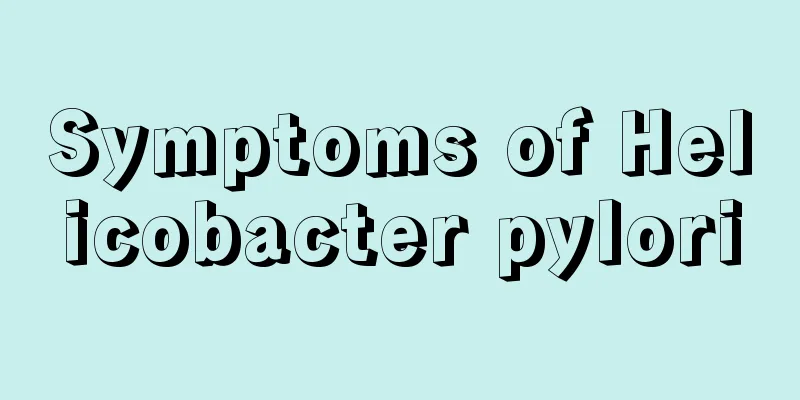Symptoms of Helicobacter pylori

|
Intestinal diseases are very harmful. They usually cause serious inflammation in the intestines, which has a very adverse impact on the patient's life. For example, Helicobacter pylori is a relatively common bacterial virus and is one of the root causes of various intestinal diseases. Let's take a look at the symptoms of Helicobacter pylori. Let’s take a look at the explanation below, I hope everyone can understand it. Helicobacter pylori is a Gram-negative bacillus that is spiral in shape, microaerophilic, and has very strict requirements for growth conditions. It was first successfully isolated from gastric mucosal biopsy tissue of patients with chronic active gastritis in 1983. It is the only known type of microorganism that can survive in the human stomach. symptom: 1. Bad breath Helicobacter pylori is one of the most direct pathogens that cause bad breath. Since Helicobacter pylori can survive in dental plaque, after infection occurs in the mouth, it will directly produce smelly carbonized substances, causing bad breath. 2. Gastrointestinal disease symptoms Patients infected with Helicobacter pylori often experience gastrointestinal disease symptoms such as postprandial belching, nausea, bloating, and abdominal discomfort, and these symptoms can occur at any time. However, some patients do not have obvious symptoms and can only be discovered by going to the hospital for relevant examinations. 3. Cancer As the disease becomes more serious, it will gradually damage the gastrointestinal wall and cause cancer. Moreover, patients infected with Helicobacter pylori generally suffer from stomach problems, and most patients with stomach problems have a certain relationship with Helicobacter pylori. 4. Dysbacteriosis Symptoms of Helicobacter pylori: Infected people usually show positive results in examinations, but generally do not have any symptoms. The virus will cause long-term destruction, parasitism, and reproduction in the patient's body. As the disease progresses, Helicobacter pylori will cause bacterial flora imbalance and cause a series of other symptoms. Prevention methods: 1. Avoid cluster infection To prevent Helicobacter pylori, family cluster infection with Helicobacter pylori should be avoided. It is understood that Helicobacter pylori infection has a tendency to cluster in families. In addition, the probability of parents infecting their children is relatively high. People infected with Helicobacter pylori are advised to actively prevent their family members from being infected. 2. Oral health must be maintained People infected with Helicobacter pylori generally have oral problems such as bad breath, so for those who are negative for Helicobacter pylori infection, maintaining oral health is imperative. This lays the corresponding preventive foundation for how to prevent Helicobacter pylori in the future. |
<<: Can I take cold medicine after getting vaccinated
>>: Is it necessary to get the measles, mumps and rubella vaccine?
Recommend
What are the symptoms of late-stage pituitary tumors
The incidence of pituitary tumors tends to increa...
Difference between skin cancer and acne
Everyone knows that skin diseases are serious. Th...
What harm does galvanizing do to people
Zinc is an indispensable element for our body, bu...
Dietary guidance for liver cancer
Patients with liver cancer actually still have a ...
What food to eat if you have symptoms of pharyngitis
Pharyngitis is a relatively common disease, which...
What does the examination for varicose veins in the lower limbs include?
Varicose veins in the lower limbs are a very comm...
How to prevent lung cancer in daily life? Lung cancer patients should take three levels of prevention measures
For lung cancer, many people know that this disea...
Can I drink soy milk if I have diarrhea?
Soy milk is something we often drink in our lives...
Revealed! Exact hot pot spice base recipe
The hot pot business can be said to be extremely ...
My chest hurts when I breathe in
Breathing is to provide the body with enough oxyg...
How to soak olives in wine
Olives are a familiar food to many people. Olives...
Is hyaluronic acid or prosthesis better for rhinoplasty
To be honest, the nose is really an important org...
Can peanuts soaked in vinegar help enlarge breasts?
Many women have less full breasts and less elasti...
How to cut rapeseed
There are many ways to cook rapeseed. As a green ...
What are the treatment methods for hamartoma
Patients with hamartoma generally do not have obv...









